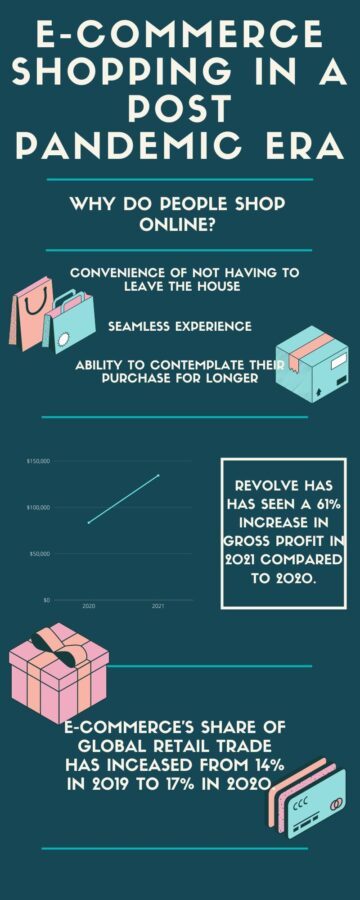SMU alumna Carey Mckellar recalls one experience in particular about March of 2020 — sitting in front of her MacBook computer, scanning numerous sites, searching for her next pandemic purchase.
“Shopping online became almost a hobby for me,” McKellar said. “I was buying not necessarily out of need, but out of boredom and convenience at first.”
From the tie-dye sweatshirts she saw advertised on Instagram to new materials to make her own version of the DIY corsets she saw trending on TikTok, anything was fair game for Mckellar as she became more familiar with making purchases online.
Although she said she previously preferred in-person shopping, the convenience of buying online has transformed her spending habits to almost strictly digital, even with brick-and-mortar stores re-opening for their customers.
“Even though the pandemic is basically over, I still love to shop online for almost every product or piece of clothing I need for my everyday life,” she said. “Now when I want to buy something I go straight online because it is so much easier and way more convenient.”
When life almost completely halted at the outset of COVID-19, so did brick-and-mortar shopping. Customers could no longer browse their favorite stores but instead were restricted to purchasing clothing online.
Now COVID-19 has transformed the fashion industry permanently as companies have begun to transition their efforts to focus on e-commerce in order to cater to the changing needs of their customers.
According to the United Nations Conference on Trade and Development (UNCTAD), as lockdowns became normal at the beginning of the pandemic, people began to shop digitally. Before the pandemic, e-commerce’s share of global retail trade was already on the rise. In 2019, it was 14%; the next year, it increased to 17%, due in part to customers shopping online after COVID-19 shut down stores in March 2020.
In addition, according to UNCTAD acting Secretary-General Isabelle Durant, the ability of companies to transform their business model to include a strong focus on e-commerce, as well as the ability of customers to be willing to go digital has helped mitigate the economic downturn caused by the pandemic.
Revolve, an e-commerce company focusing on women’s contemporary fashion has seen significant growth in the last few years, even with COVID-19 disruptions.
Revolve partners with various social media influencers, allowing the company to use digital selling and grow its business through platforms such as Instagram and TikTok. The content creators they work with act as more than simply brand ambassadors and help Revolve personalize their marketing strategies and sell to more niche audiences to increase sales.
According to Revolve’s Third Quarter 2021 Financial Summary, the company saw seen a 61% increase in gross profit in 2021 in comparison to 2020.
Laura Bradley, who has worked at Revolve for the past five years, said the increase in traffic to the company’s website, as well as the increase in purchases they saw during COVID-19 lockdowns, has continued to the present day.
“I think because people were stuck inside their homes for so long, they became really comfortable with the concept of looking through e-commerce sites for new clothing,” Bradley said.
Revolve categorizes its products by designer, color, size and occasion, allowing online shoppers to purchase their favorites with ease.
“We try to make it as simple as possible for customers to find the products they are looking for without ever having to leave their homes,” Bradley said.
Hannah Chavez, an e-commerce specialist at Stanley Korshak said the trust and relationships built and fostered between the company and its customers during the pandemic have helped e-commerce grow more quickly in a post-pandemic world.
“I really do think that because so many customers were forced to either purchase online or not at all, we earned the trust of customers that did not feel that shopping online was safe or even real shopping,” said Chavez who has worked at Stanley Korshak since 2019.
Chavez said new promotions online, as well as a seamless shopping experience, can help open a new avenue for customers who previously only worked with sales associates in-store or over the phone.
“A Google search is much easier on a working mom that can’t make it into a store for a new dress or an older gentleman looking for a retailer that carries his favorite shoes,” Chavez said. “You can do your research on a piece and think over the purchase when it’s made online differently than in-store — and you can purchase any time of day.”
With the pandemic almost completely behind her, Mckellar said she is finally excited to experience life again, which makes finding the perfect pieces of clothing so important.
“I am excited for a new era of life in a post-pandemic world,” Mckellar said. “Fashion is a huge part of who I am and even though there are a million bad things I can say about COVID-19, I am happy to at least have discovered another form of shopping that I am comfortable enough to use to purchase any piece of clothing.”














